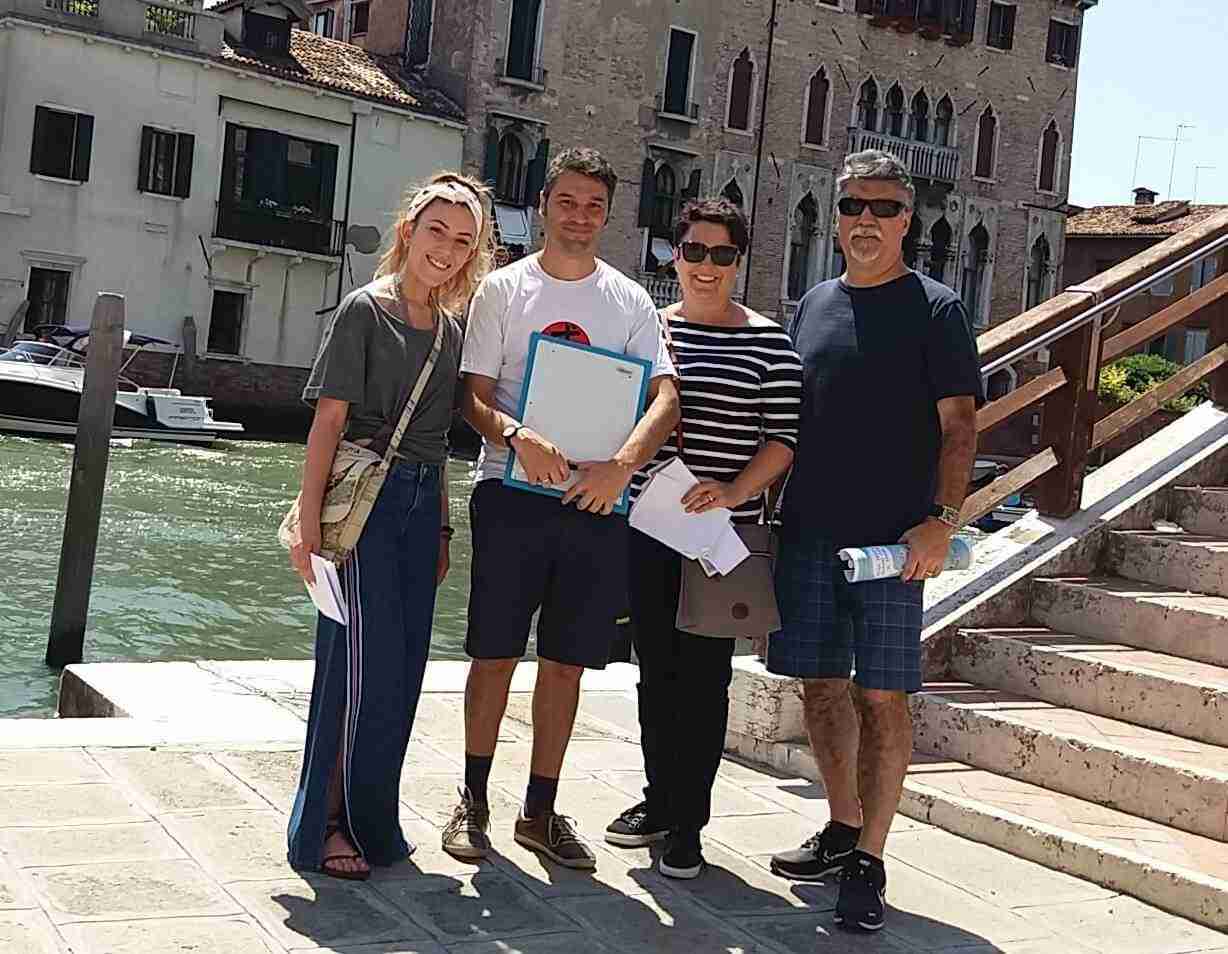What is the fastest way to learn Italian?
Realistic goals and commitment. But also: singing, cooking, chatting, and watching movies. Learning a language means diving deep into the culture of the country, tasting its flavors, and getting lost in the cities’ alleys. So, if you are wondering how to learn Italian fast, you’ve come to the right place.
In this article, we introduce you to 10 strategies and tips that will help you quickly learn Italian grammar, improving your fluency and pronunciation. Some of these will surprise you. Some may seem bizarre. Nonetheless, for sure, among all of them, you will find the system that suits you best and will allow you to learn Italian quickly.
Why learn Italian?
Whether you love the sunshine and the Mediterranean atmosphere, are a foodie, or adore art and literature, Italy is the place for you. The warm climate, the exquisite cuisine, and the incredible richness of its artistic and cultural heritage are just some of the features that make Italy a unique country. Learning Italian will allow you to enjoy to the fullest all that Italian culture has to offer while getting away from the usual tourist circuits: imagine being in Venice and being able to escape for a moment from the crowds thronging St. Mark’s Square to ask for a cicchetto at one of the little stalls in the calli (streets) of the center.
Even if you don’t plan to visit Italy soon, why not immerse yourself in Italian culture and art? Italian is a language with a long and rich literary history, famous for opera, theatrical play, music, and movies. To learn Italian means to be able to connect with centuries of European and Mediterranean history and culture.
Have we convinced you? Then follow us.
10 Ways to Learn Italian Fast
1. Set Realistic Goals

Quickly does not mean overnight! Before you embark on this endeavor, it might be helpful to take a moment to set your goals. It may not take you just a few nights, but setting goals clearly and realistically will enable you to learn Italian quickly. You can apply the S.M.A.R.T. strategy, establishing from the get-go specific, measurable, achievable, relevant, and time-bound objectives.
Instead of vague resolutions such as “I want to learn Italian”, you can focus on “My goal is to be able to sustain an interview in Italian” (Specific) or think “I want to pass the CELI (Certificate of Italian Language Acquisition) 3 test by the end of the year” (Measurable and Time-bound) or plan to “be able to understand my favorite Italian Singer’s song” (Achievable and Relevant).
2. Practice makes perfect
In studying a language, constant speaking practice is crucial in the learning process. Whether you like to practice in groups, or you prefer to proceed at your own pace, what matters is consistency. Practicing with a native speaker is one of the best ways to learn quickly, which will familiarize you with the rhythm of the spoken language and improve your fluency.
3. Mangia!
This is probably one of the best-known aspects of Italian culture: Italians are culinary enthusiasts! Cooking an Italian dish brings you in touch with one of the most relevant aspects of Italian culture.

Moreover, it is also an opportunity to improve your Italian. How? Recipes are written in a simple and clear language, easy to understand. The simplicity of the syntax will allow you to focus more on the meaning of the sentences and terms. In addition, recipes offer various terms related to daily life and actions. This is probably one of the best ways to learn Italian…while tasting a steaming, huge plate of amatriciana!
4. Listen to Italian music
Yes, listen to music. And sing, also. You might be surprised to discover how much listening to music and singing can help you improve your Italian. If you’d like to give it a try, here you can find 7 perfect songs to sing to learn Italian fast.
5. Travel or Study Abroad
Traveling is one of the best ways to learn languages. Visiting a country is the easiest way to come into direct contact with the language and culture of the place. This will allow you to quickly learn the basics of grammar and vocabulary and also give you the chance to put into practice what you have learned right away, as you discover new places and experience new things. Can you imagine yourself sitting in St. Mark’s Square at sunset, chatting with your new friends as you reproduce the intricate pinnacles of the basilica on the paper in front of you? Sounds good, doesn’t it?
Italian courses in Venice
Small groups, maximum motivation

6. Watch series and movies in Italian
Watching movies is another stimulating method of learning a foreign language. You could start by watching famous blockbusters, produced in English and dubbed into Italian, such as the Marvel films, the Harry Potter saga, Lord of the Rings, The Hobbit, and Pirates of the Caribbean. In this case, the plot is easy to follow, and the dialogues are simple and articulated without dialectal or regional inflections. The availability of subtitles (strictly in Italian!) will also make it easier for you to follow and identify more words.
Once you become familiar with the language you could move on to films produced and acted in Italian, in which sometimes the characters’ characterization comes through dialectal speech or regional cadence. You can choose a classic, switching between the dreamy atmospheres of La Dolce Vita and the wartime dramas of Roma Città Aperta. Or a funny comedy like Smetto Quando Voglio. For those who want to stick to blockbusters, however, look for Lo chiamavano Jeeg Robot and Freaks Out.
7. Learn idiomatic expressions
“Hai preso un granchio!”, you got a crab. If you hear this phrase, know that it has nothing to do with crustaceans. People are telling you that you made a mistake. Italian is full of idiomatic expressions and rather bizarre idioms like this one. Learning them could be quite helpful in understanding everyday language.
However, memorizing them might be difficult for those who do not speak Italian as their native language, since it is often difficult to translate their meaning literally. In this case, one of the tricks to learn them quickly is to associate these phrases with the image evoked by the phrase itself, which is often funny and paradoxical. This will make it easier to remember them.

If idioms fascinate you and you want to gain more confidence in understanding the spoken language, this book collects 50 idiomatic phrases, accompanying them with an explanation of the meaning and an illustration that will allow you to memorize their meaning better…so you won’t pick up crabs anymore!
8. Read comics and teenagers’ books
This too may seem like a bizarre suggestion, but children’s books are ideal for practicing Italian comprehension and learning certain phrases. Again, the simplicity of the text makes it easy to understand. You can start with texts for which an English version is available (so that they were written in English and translated into Italian, or vice versa). When you have gained more confidence and fluency in reading you can move on to children’s classics, such as Pinocchio.
The advantage of comic books, on the other hand, is represented by the pictures that match the text, making it easier for you to follow the story and help you put the dialogues in context.
Learn Italian Online
Studying Italian via Skype or Zoom is easy with us

9. Keep a journal in Italian
In recent years, several studies have pointed out that the practice of keeping a journal is a particularly effective tool for personal study. Writing a diary makes it possible to improve the organization of self-study and the information gathered. In the study of a new language, this becomes even more effective as it is an opportunity to practice one’s written production.
Writing in an informal and personal context will make it less stressful, allowing you to become more natural. You might start by writing down as many of the phrases you remember immediately after class and create variations of them, imagining the occasions when you might use them (or hear them).
This exercise will quickly improve your ability to transition from simple sentences to more complex notes on various topics (describing yourself, your family, the room you are in, and your feelings). A journal also will allow you to keep track of your progress, but we will discuss this in the next section.

10. Stay Consistent and Patient
In this last point, we pick up where we opened in point 1: how to succeed in keeping our commitment constant? Setting realistic goals for yourself, as mentioned above, is a great starting point for succeeding in taking your first steps in studying a new language. But how to continue? Here are three simple tips (+ 1) that will help you keep your commitment constant, enabling you to learn Italian quickly.
Make it part of your routine
Include in your schedule a daily time slot when you will devote yourself to studying Italian. This will make it easier to get organized and dedicate the necessary time and concentration to your study. Whether it is your class time or your study moments, marking it on your planner will reinforce your commitment. If you use a digital planner, it will be easy to set a reminder that it is time to study. If you prefer a paper one, however, you can still set an alarm on your phone or leave a post-it note in a place where you can see it.
Diversify learning activities
Studying grammar and vocabulary is essential to learning a language. However, diversifying activities will be crucial to continue to stimulate your interest and keep your motivation high. Watching movies, singing, cooking, traveling…in the paragraphs above we have given several examples of activities you can draw inspiration from to practice Italian away from the grammar book.
Be patient with yourself. Despite the simple rules of pronunciation, Italian is a language with a rather rich and complex grammatical structure. Do not be discouraged if at first, you find it difficult to memorize the correct verb tense or to remember the right gender for nouns. After some time you will begin to get the hang of it, and it will come naturally to you to choose the right verb or article.

Track your progress
As we saw in point 9, keeping track of your progress has several benefits in the learning process. This practice allows you to establish your goals more clearly, highlight your strengths, and identify any gaps that need to be filled. In addition, being aware of your steady progress will help you feel motivated to continue and proud of your achievements.
…and don’t forget to celebrate your progress! This point is just as important as the others: rewarding yourself for your achievements helps to keep you engaged. Have you been able to memorize the tense pattern of the verb “to be”? Well, this is something that deserves a reward.
How to Learn Italian in a Week?
If you are an absolute beginner and want to learn Italian but only have a week available, you can take an intensive individual course. Suppose you are in Venice for a week; you could learn to answer questions such as where, how, why, what, who, and when. Additionally, you could learn to book a restaurant, politely ask for the bill, request information on the street or in shops, describe your typical day, and have a simple conversation using the present tense or the present with a future function. In Italian speech, we often use the phrase “What are you doing today?” in the present tense. In English, however, we do not use the present tense but rather the form “going to do.”
You won’t learn all of Italian in such a short time, but you will start to create a good foundation on which to continue working alone or with other teachers, whether in Italy, online, or in your country.
Learn Italian in a week in Venice
Our courses are tailored to immerse you in the beauty of the Italian language. Ready to explore?

What is the fastest way to learn Italian?
As you can see, there are many ways you can start learning Italian quickly. We have seen here some strategies to better organize your study and maintain your commitment, as well as many resources and activities that you can combine with your lessons in class or with your tutor. Several of these resources are free and can be easily accessed from home through different platforms and websites, for example, YouTube or recipe websites.
Italian is still today the language of art and of the thousand-year history of the crossroads of peoples who met in this corner of the Mediterranean. Learning it can become an exciting challenge in itself. Whether you decide to do it for your career, personal growth, study, or simply for passion, all you have to do now is get started.
And all we have to do now is to wish you “Buona fortuna!”.

Recent Comments